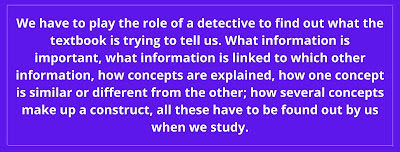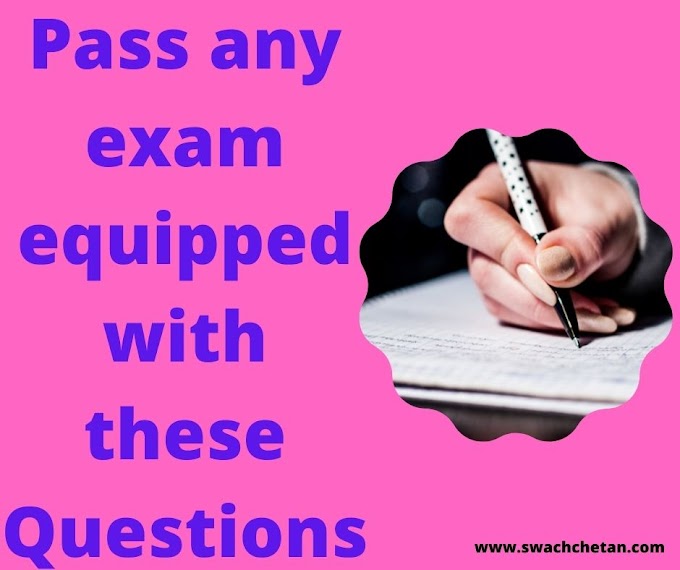Pass any examination equipped with these Questions
Very few people can tell you about them!
Your effort throughout the semester is measured within three hours of the examination. Just to write for three hours, should we spend almost six months? Is there no way we can engage in our learning faster and more efficiently so that we have time to do other things in life? Here I will tell you how to pass any examination equipped with these questions.
Type of general questions you should ask before you start studying
Before we jump into the water, we should have some idea about the depth of the water.
The following questions will help you to test the
waters before you take action.
- Why should I study this?
- What do I already know about this?
- What am I supposed to know about this?
- Is what I know enough for the exams?
- What do I lose if I do not know this?
- Where have I already come across this?
- Is this something new for me?
Become a detective when you study
Just like a detective who tries to find out what has happened, how it happened, what proofs are left behind, how can you reconstruct the occurrence, etc., a student should also be able to determine the antecedents of the topic in the textbook.
We need to have patience like detectives and wait for information to flow in.
You always start with very little, but as you progress,
start collecting relevant and crucial information to the topic at hand.
Just as the detective produces evidence, your answers during the exams must be able to put forth evidence for the questions being asked.
While investigating, ask the right kind of questions,
extract information, and ask yourself the following questions:
- What will I learn in the class?
- Have I already learned it?
- What new am I learning?
- Is my learning similar to the previous learning?
- Am I learning anything extra?
- How can I establish the link?
Always start with a question
Do not read anything without a question. Because the brain
works that way only.
All information has to be stored somewhere. You always store
something in a container. The bigger the container, the larger the information
you can store. A big container will have many questions.
When you take in the information without a question, it is like pouring water on a flat surface. You can pour all you want, but nothing gets stored. The moment you question yourself, the curiosity will stop the information from flowing out and act as a container of information.
Even if they are simple questions, ask them. “Why should I study this?” “What do I learn out of it?”
An elaborate framework
The framework for asking the questions is based on Bloom’s Taxonomy (The Cognitive Version).
Knowledge-related questions can be What, Where, When, List, List in order, Narrate, State, Write, Label, Name, or Define. All these are usually one-mark questions.
Comprehension questions can be Why, How, Explain, Interpret, Describe, Summarize, Illustrate, Paraphrase, Elaborate, or Elucidate. These are usually two to five-mark questions. They would want to know that you not only know it but also can explain it. Sometimes, both these questions are combined to form a single question.
Application questions can be Uses, Solve, Calculate, Compute, Demonstrate, Apply, Construct, or Examine. Here they are testing your ability to apply your knowledge. These have 5 to 10 marks.
Analysis questions can be in terms of Analyze, Categorize, Separate, Derive, Compare, or Contrast.
Synthesis questions can be Formulate, Makeup, Design, Create, Develop, Invent, or Hypothesize.
Evaluation questions can be Determine, Select, Critique, Evaluate, Recommend, Justify, Judge, Advantages & Disadvantages, Merits & Demerits, and Pros & Cons.
Pick up the relevant question for each topic when you study. Try to answer them on your own without looking at the notes or textbook. Once you can answer them completely, the answer stays in your memory because the answer you have written has been linked to the question. The moment you see the question in the examination, the answer starts flowing onto the answer paper.
Imitate examinations every time you study
If you make this examination comfortable for you, the next exam will be even easier for you.
We have been indoctrinated to think negatively about the exam. We are studying for the whole semester/year because of the examinations only.
When we have a negative attitude towards a goal, we start avoiding it rather than approaching it. Because we are forced to write the examination, we are unable to avoid it but our negative attitude makes it painful to deal with the examination.
Imagine a football player hating to score a goal. The moment he goes near the goal, he freezes. Would you consider him a good football player? What is the fun of playing or watching football if players do not want to score?
Study what is essential for the examination
We have only practiced reading. Is there a reading examination, where they give a textbook and ask you to read for three hours? If there is one, then the method we are using is right. But now we are expected to sit for three hours continuously and write answers for a fixed number of questions.
The next question is to write from where?
We are expected to reproduce answers from memory but during studies, we always keep something nearer to us – a textbook, notes, study material, points, reference material, etc. None of these are allowed during the examination.
So, during practice too, we are not supposed to refer to anything but what we have stored in our memory.
We are constantly judged based on what we write in the examination. Suppose you inform in your answer paper that you have studied throughout the year, spent a lot of time on this particular question, and know everything. Would anyone give you marks for that?
The only way you can prove that you have done all this is by writing the answer. If your answer is as expected, it is assumed that you have studied properly.
For every question that is asked, the valuer of the paper expects a particular answer. Do we know what they expect? Have we practiced that?
Anything you write, you should write from your memory. No books or materials should be open.
🔔 TIP from Swach Chetan 🔔
During practice make all the mistakes
We should commit mistakes now rather than in the examination. We can’t correct our mistakes in our exams and they will prove dearer to us.
Make it a habit to study only by asking questions. Make a list of all the questions and pick up those that are relevant to what you are studying. This way you can face any exam in life with certainty.












Please do not include any spam links in the comment box.